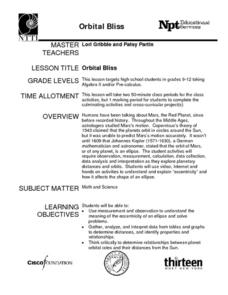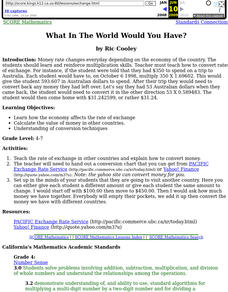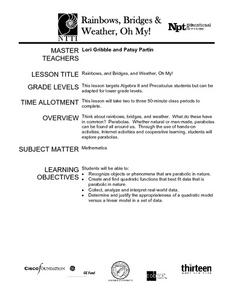Curated OER
A Nation of Nations Lesson Plan: Charting African Ethnicities in America
Students read a portion of the narrative, The Transatlantic Slave Trade, to explain the ethnic origins of enslaved Africans brought to the US. They create charts and bar graphs comparing ethnicities in the lowlands and tidewater regions.
Curated OER
M & Ms in a Bag
Students make predictions about the number and colors of M&M's in a snack size package. They create an Excel spreadsheet to record the data from their small group's bag, create a graph of the data, and discuss the variations of data...
Curated OER
Orbital Bliss
Most young mathematicians are aware that the planets don’t orbit the sun in a circle but rather as an ellipse, but have never studied this interesting feature. This resource looks at the planetary orbits in more detail and helps learners...
Curated OER
The Laws of Sines and Cosines Made Simple!
Students study the law of sine and cosine. In this pre-calculus lesson, students create a triangle and identify the different ratios of a non-right triangle. They use the properties of sine and cosine to solve.
Curated OER
Data Displays with Excel
Young scholars collect and analyze data. In this statistics lesson plan, students display their data using excel. They plot the data on a coordinate plane and draw conclusion from their data.
Curated OER
Distance in Space
Sixth graders explore space science by measuring distances between planets. For this solar system lesson, 6th graders view a Bill Nye video and discover the conversion between the metric system and imperial measuring systems. Students...
Curated OER
A Home for a Cricket
First graders build a habitat for crickets after studying animal survival needs. They care for and observe the crickets in the classroom habitat.
Curated OER
The Pythagorean Theorem
Students research Pythagoras and learn how to apply his theorem. They solve real life problems using the theorem and demonstrate knowledge of exponents, equations, and radicals. Students include diagrams in their research papers.
Curated OER
Coordinate Plane
Students use computer applets to demonstrate three dimensional coordinate planes. In this coordinate planes lesson plan, students play a coordinate game and a maze game.
US Apple Association
Apples: A Class Act! (Grades Pre-K–3)
Discover the nutritional wonders of apples and get to know Johnny Appleseed with a plethora of learning experiences that cover subjects math, history, English language arts, health, and arts and crafts. Activities include an apple...
Curated OER
What In The World Would You Have?
Learners calculate value of money in other countries, and explore how the economy affects the rate of exchange.
Curated OER
Get In Line!
Learners compare and order fractions and decimals using a number line. They use rules of conversion to determine equivalencies competing problems accurately and plot points on the number line that represent the correct order of the...
Curated OER
Rainbows, Bridges & Weather, Oh My!
Explore how real-world applications can be parabolic in nature and how to find quadratic functions that best fit data. A number of different examples of modeling parabolas are explored including a student scavenger hunt, the exploration...
Curated OER
Mat 0024 Section 1.4: Signed Numbers and Decimals
This activity has a little of everything. Compare fractions, determine if numbers are less than, greater than, or equal to. Then practice lining up the decimals to add and subtract decimal numbers. Then multiply decimals remembering to...
Curated OER
Batteries in Series: Voltage and Light Intensity
Students participate in a hands-on activity to explore the relationship between the number of batteries in a series circuit and its voltage. Students identify the relationship between two variables and plot points on a graph.
Curated OER
It's In The Chocolate Chips
Students investigate which brand of chocolate chip cookies contains the most chocolate. They analyze and compare data using Microsoft Word and Microsoft Excel. They communicate the results with Microsoft PowerPoint.
Curated OER
Completing the Circuit
Students use a battery, wires, small light bulb and a light bulb holder to learn the difference between an open circuit and a closed circuit, and understand that electric current only occurs in a closed circuit. They describe the...
Curated OER
Aqua-Thrusters!
Young scholars construct their own rocket-powered boat called an "aqua-thruster." These aqua-thrusters will be made from a film canister and will use carbon dioxide gas - produced from a chemical reaction between an antacid tablet and...
Curated OER
The North (Wall) Star
Students engage in a lesson which shows them that celestial navigation is the art and science of finding one's geographic position by means of astronomical observations, particularly by measuring altitudes of celestial objects - sun,...
Curated OER
Wind Power
Fourth graders develop an understanding of how engineers use wind to generate electricity. They will build a model anemometer to better understand and measure wind speed. They discover that engineers design wind turbines that generate...
Curated OER
Topos, Compasses, and Triangles, Oh My!
Students triangulate using a compass, topographical (topo) map and a view of outside landmarks. They take a field trip to another location away from school and mark discernible landmarks (like mountains or radio towers) and changes in...
Curated OER
Heredity Mix 'n Match
Students randomly select jelly beans that represent genes for several human traits such as tongue-rolling ability and eye color. Then, working in pairs (preferably of mixed gender), students randomly choose new pairs of jelly beans from...
Curated OER
How To Make Yeast Cells Thrive
Students set up and run the experiments they designed in the lesson, 'Population Growth in Yeasts,' using simple yeast-molasses cultures in test tubes. They demonstrate understanding that several environmental factors can contribute to...
Curated OER
Electricity: Will It Conduct?
Students build conductivity testers and investigate which solids and solutions conduct electricity. Working in groups, they predict which items will conduct electricity and record their answers on worksheets.

























